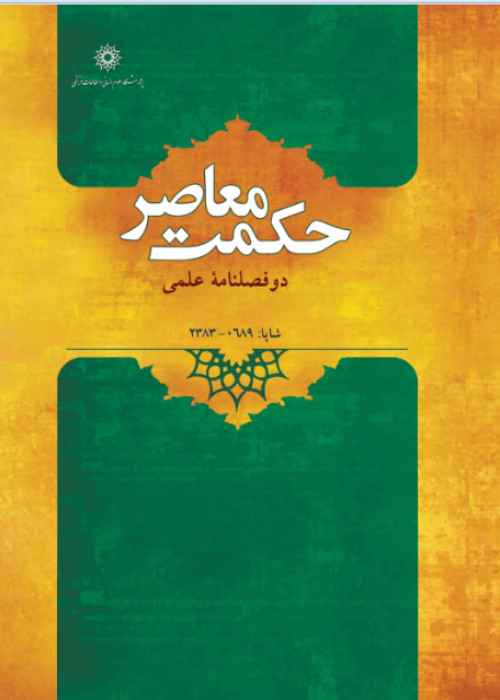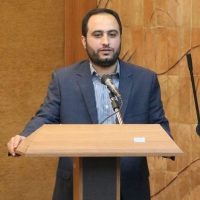Examining the Functions of Practical Reason in the Process of Issuing Intentional Action in Transcendental Wisdom
Mulla Sadra differentiates between "action" and "intentional action". He considers the intentional action as an action, which is caused by second-order consciousness of the purpose of the action (Mulla Sadra 1981, 2/223). His interpretation of this second-order consciousness is "awareness of purpose" (Mulla Sadra undated, 69). According to him, the voluntary Agent is different from the intentional Agent. An intentional Agent is an Agent who not only intends to perform the action, but also has second-order consciousness of the purpose of the action (Mulla Sadra, 1354, 134); That is, he knows what he is doing and what purpose he is trying to achieve. This second-order consciousness leads to the transformation of action into intentional action and the feeling of free will. It seems that this ability is specific to the human soul and the faculties that is specific to this soul. The basic issue of this research is the analysis of the role of "practical reason" as a consciousness-creating factor in this process - that is, the process of converting a "voitional act" into an "intentional action" - in Mulla Sadra's philosophy. For this purpose, by searching in the works of Mulla Sadra, the authors try to evaluate the functions of "practical reason" in the process of issuing action and reveal its position as an "consciousness-creating factor" among the principles of action.
Methods and Material:
The research method of this paper is descriptive-analytical method. In this way, by referring to the different works of Mulla Sadra, the authors try to provide a complete description of his opinions. Then, by analyzing his opinions based on logical requirements, it is tried to discover the functions of practical reason in the process of intentional action in Mulla Sadra's philosophy.
The element of "second-order consciousness", which is the condition for turning a voluntary action into an "intentional action", is one of the characteristics of the human soul, and animals lack such an element (Mulla sadra 1981, 6/312). In other words, animal souls have perception through their faculties; but they don't have second-order consciousness to their faculties and their perceptions; but the human soul has the ability to aware of the "self" and "its faculties” as a part of its perception (Mulla sadra 1981, 6/251). This feature is achieved by "reason faculty" for this soul (Mulla sadra 1363, 133-132). It seems that practical reason with three functions transforms voitional act into intentional action and brings second-order consciousness to a person.The first function of practical reason is the positive function. According to Mulla Sadra, the only faculty that creates particular mental forms is not the “imaginal faculty”; Rather, the practical reason has also the ability to create them (Mulla sadra 1363, 516-516). According to him, the affirmation of benefits is done in the imaginary level by the imaginal faculty and in the rational level by the practical reason (Mulla sadra 1382, 2/1037). The rational level here does not mean general mental forms, because MullaSadra points out that decision of doing an action always require partial mental forms (Mulla sadra 1363, 516) and he states also that practical reason is the ability to perceive practical mental forms (Mulla sadra 1360, 200).The second function of "practical reason" refers to the judgment about the practical mental forms that the imaginal faculty has acknowledged their usefulness. In his sensory and imaginary encounters with the real world, a person creates images of action. When the imaginal faculty creates a practical image in the imagination and decides to issue it based on nature of body; practical reason evaluates its acceptance, and it judges the goodness and badness of that partial practical judgment based on general normative patterns (Mulla sadra 1354, 261). The third function of "practical reason" in the process of issuing an intentional action is managing the imaginary passions of a person towards performing an action. This role-playing actually occurs at a time when the imaginal faculty orders the performance of action A and in this way, arouses the lust or anger of a person to do it. This function is different from the previous function; because the practical reason in the previous function used to make judgments about the decision of the imaginal faculty; But in this function, practical reason manage lust or anger which is the result of the decision of the imaginal faculty. Mulla Sadra referred to this function as "caring" (Mulla sadra 1981, 3/419).
In transcendental wisdom, the Reason is a self-aware power; this means that it can rationalize itself and achieve second-order self-consciousness. The Reason rationalizes not only itself, but also other perceptive and practical powers. Rationalizing here is not the understanding of the general mental form, but the acquisition of second-order consciousness.According to Mulla Sadra, "intentional action" is different from "voluntary action" because "intentional action" is an action that is the result of the will along with the "second-order consciousness of the agent" for the purpose of the action. According to the this explanation, the element of "second-order consciousness" is an element that is obtained by adding "practical reason" to the principles of action;Therefore, "intentional action" is a voluntary action in which "practical reason" plays a role in its process. Practical reason with three different functions brings second-order consciousness to the human soul: imagining particular and practical mental forms, acknowledging its usefulness and managing perceptual and motivational other faculties.
- حق عضویت دریافتی صرف حمایت از نشریات عضو و نگهداری، تکمیل و توسعه مگیران میشود.
- پرداخت حق اشتراک و دانلود مقالات اجازه بازنشر آن در سایر رسانههای چاپی و دیجیتال را به کاربر نمیدهد.



